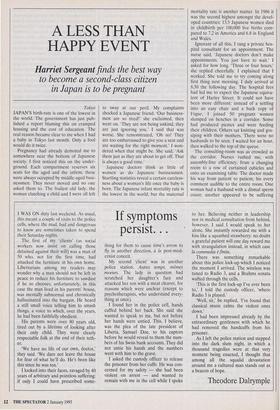If symptoms persist. . .
I WAS ON duty last weekend. As usual, this meant a couple of visits to the police cells, where the mad, bad and dangerous to know are sometimes taken to spend their Saturday nights.
The first of my 'clients' (as social workers now insist on calling those detained against their will) was a man of 50 who, not for the first time, had attacked the furniture in his own home. Libertarians among my readers may wonder why a man should not be left in peace to reduce his furniture to sawdust if he so chooses; unfortunately, in this case the man lived in his parents' house, was mentally subnormal and chronically hallucinated into the bargain. He heard a still small voice telling him to smash things, a voice to which, over the years, he had been faithfully obedient.
His parents were over 80 years old, tired out by a lifetime of looking after their only child. They were clearly respectable folk at the end of their teth- er.
'We have no life of our own, doctor,' they said. 'We dare not leave the house for fear of what he'll do. He's been like this since he was ten.'
I looked into their faces, ravaged by 40 years of arbitrary and pointless suffering: if only I could have prescribed some-
thing for them to cause time's arrow to fly in another direction, a la post-mod- ernist conceit.
My second 'client' was in another police station. Autres temps, memes moeurs. The lady in question had scratched her daughter's face and attacked her son with a meat cleaver, for reasons which were unclear (except to psychotherapists, who understand every- thing at once).
I found her in the police cell, hands cuffed behind her back. She said she wanted to speak to me, but not before her hands were untied. This, I believe, was the plea of the late president of Liberia, Samuel Doe, to his captors before he would reveal to them the num- bers of his Swiss bank accounts. They did not untie his hands and the numbers went with him to the grave.
I asked the custody officer to release the prisoner from her cuffs. He was con- cerned for my safety — she had been violent on arrest — and wanted to remain with me in the cell while I spoke to her. Believing neither in leadership nor in medical consultation from behind, however, I said I would speak to her alone. She instantly rewarded me with a kiss like a squashed strawberry: no doubt a grateful patient will one day reward me with strangulation instead, in which case la commedia e finita.
There was something remarkable about this police lock-up which I noticed the moment I arrived. The wireless was tuned to Radio 3, and a Brahms sonata wafted through the cells.
'This is the first lock-up I've ever been to,' I told the custody officer, 'where Radio 3 is played.'
'Well, sir,' he replied, 'I've found that classical music calms the violent ones down.'
I had been impressed already by the extraordinary gentleness with which he had removed the handcuffs from his prisoner.
As I left the police station and stepped into the dark slum night, in which a thousand tragedies were at that very moment being enacted, I thought that among all the squalid devastation around me a cultured man stands out as a beacon of hope.
Theodore Dalrymple










































 Previous page
Previous page